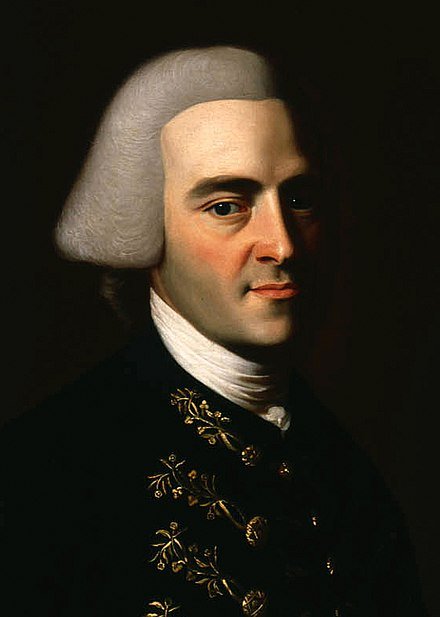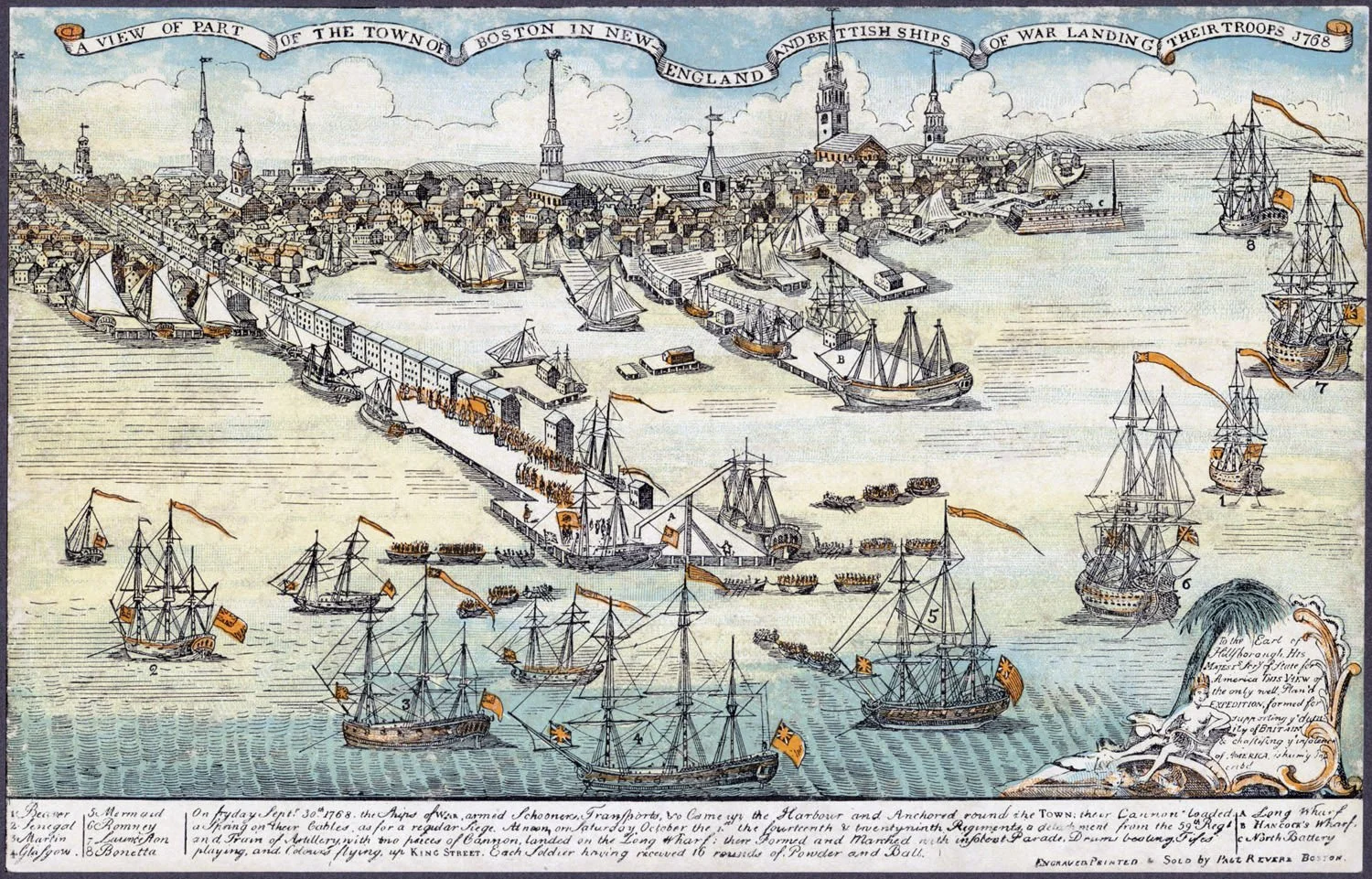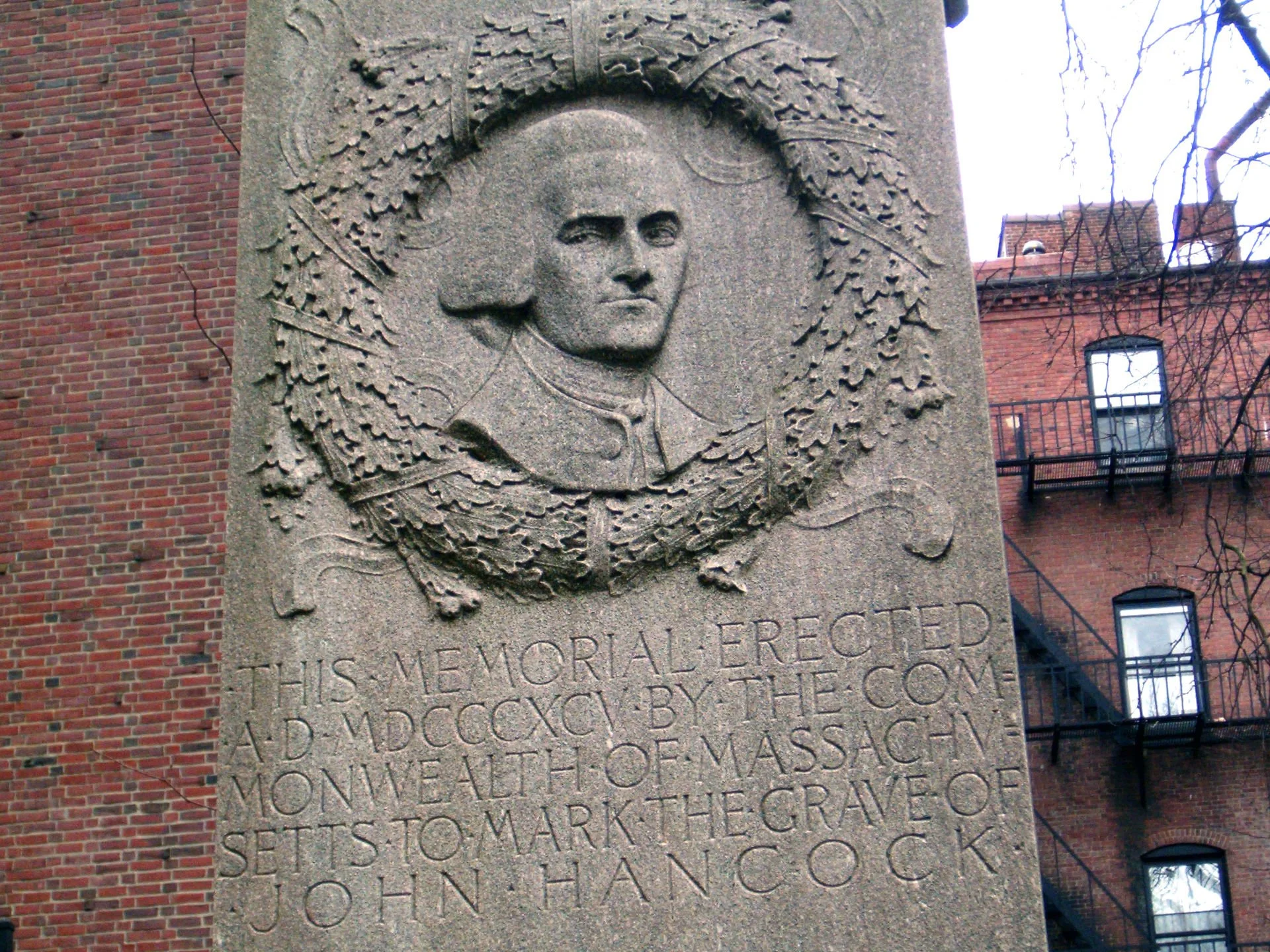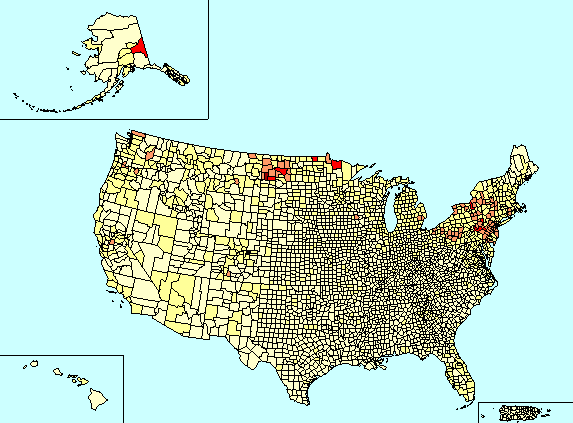
‘Despise the glare of wealth’
Surely you never will tamely suffer this country to be a den of thieves. Remember, my friends, from whom you sprang. Let not a meanness of spirit, unknown to those whom you boast of as your fathers, excite a thought to the dishonor of your mothers I conjure you, by all that is dear, by all that is honorable, by all that is sacred, not only that ye pray, but that ye act; that, if necessary, ye fight, and even die, for the prosperity of our Jerusalem. Break in sunder, with noble disdain, the bonds with which the Philistines have bound you. Suffer not yourselves to be betrayed, by the soft arts of luxury and effeminacy, into the pit digged for your destruction. Despise the glare of wealth. That people who pay greater respect to a wealthy villain than to an honest, upright man in poverty, almost deserve to be enslaved; they plainly show that wealth, however it may be acquired, is, in their esteem, to be preferred to virtue.’’
—- John Hancock ( 1737 -1793), an American Founding Father, rich Boston-based merchant, statesman and prominent Patriot of the American Revolution. He served as president of the Second Continental Congress and was the first and third governor of the Commonwealth of Massachusetts. This quote is from his “Boston Massacre Oration,’’ on March 5, 1774.
Hancock’s words evoke the brave Ukrainians
John Hancock, painted by John Singleton Copley in 1770-1772.
Paul Revere's 1768 engraving of British troops arriving in Boston was reprinted throughout the colonies
"There is a heartfelt satisfaction in reflecting on our exertions for the public weal, which all the sufferings an enraged tyrant can inflict will never take away; which the ingratitude and reproaches of those whom we have saved from ruin cannot rob us of. The virtuous asserter of the rights of mankind merits a reward, which even a want of success in his endeavors to save his country, the heaviest misfortune which can befall a genuine patriot, cannot entirely prevent him from receiving."
— John Hancock ( 17370-1793), an American Founding Father, merchant, statesman and prominent Patriot of the American Revolution.
He was president of the Second Continental Congress and the first and third governor of the Commonwealth of Massachusetts. He is remembered for his large and stylish signature on the Declaration of Independence, so much so that the term “John Hancock’’ or “Hancock” is a nickname in the United States for one's signature.
Hancock's memorial in Boston's Granary Burying Ground, dedicated in 1896
St. Vladimir's Cathedral, a Ukrainian Catholic cathedral in Stamford, Conn. It is the seat for the Eparchy of Stamford. The parish was established in 1916, and the simple brick Romanesque Revival-inspired church building was completed in 1957. There are many Ukrainian-Americans in New England.
Distribution of Ukrainian-Americans, as a percentage of the population, according to the 2000 census. The red spots have densest population of this group.
Beware adulation of wealth
Portrait of John Hancock by the famed painter John Singleton Copley, c. 1770–1772
“Despise the glare of wealth. {P}eople who pay greater respect to a wealthy villain than to an honest, upright man in poverty almost deserve to be enslaved; they plainly show that wealth, however it may be acquired, is, in their esteem, to be preferred to virtue.’’
— John Hancock (1737-1793) was a very wealthy Boston merchant (mostly from maritime trade) and prominent patriot before, during and after the American Revolution. He was president of the Second Continental Congress and was the first and third governor of the Commonwealth of Massachusetts. He is remembered for his large and stylish signature on the United States Declaration of Independence, so much so that the term "John Hancock" has become a synonym in the United States for one's signature.
Hancock's signature as it appears on the final copy of the Declaration of Independence
Hancock's memorial in Boston's Granary Burying Ground, dedicated in 1896.
Gregory N. Hicks: U.S. must stay at the trade table
The Boston Tea Party remains one of the seminal events in American history, and it continues to resonate among political elites, because most Americans believe that the “Tea Party” was a protest about taxation without representation.
It really wasn’t. It was actually about the setting of rules for international commerce without representation. John Hancock, a signer of the Declaration of Independence, merchant, ship owner and one of wealthiest men in the colonies, along with the Sons of Liberty, instigated the Boston Tea Party because the British government had given the British East India Company a monopoly to transport tea to the colonies and sell it there, effectively excluding American merchants from competing in a trade in which they had been profitably engaged. From the very beginnings of our republic, Americans have demanded the opportunity to compete internationally on a level playing field.
Two thousand years ago, Roman Senator Marcus Tullius Cicero said “the sinews of power are money, money, and more money.” This observation is as true for the 21st Century as it was in the First Century BCE. National power comes from national prosperity.
Fifteen years into the 21st Century, it is clear that the international economy has entered a transition period similar to the change that occurred a century ago, when the United States emerged as the world’s leading economic power. When that occurred, the United States did not use its economic power to influence global events, instead adopting a foreign policy of isolationism and international disarmament.
“The business of America is business,” said President Coolidge, and America’s insistence on repayment of World War I debts contributed to economic instability in Europe. Isolationism led to the Smoot-Hawley Tariff, the Great Depression and World War II.
Fully cognizant of this history as well as the necessity of rebuilding the world’s economy after World War II, the U.S. government leveraged America’s overwhelming post-war economic superiority to establish the dollar as the dominant currency of international finance and trade and to found the multilateral institutions that are the girders of today’s rules-based international economic system. The relatively level playing field for international commerce that was created has led to 70 years of economic growth and prosperity that has lifted millions from poverty.
Economies rose from the ashes of World War II by adopting key aspects of the American economic model, but in 1990, the United States was still the world’s largest economy. Our nearest competitor, Japan, had a GDP only 40 percent the size of America’s; China’s GDP was less than one-sixth the size of ours.
Today, the United States is no longer the world’s largest economy; that status belongs to the European Union. Most economists project that China will soon overtake the United States as the world’s largest national economy, although some argue that milestone has already been passed. Meanwhile, India’s economy is not too far behind.
Despite the emergence of multiple global economic competitors, the United States remains the acknowledged leader and fulcrum of the international economy. Five major trends in the global economy – the internet impact on international commerce, the emergence of global value chains, the oil exploration technology revolution, the rebound in U.S. manufacturing, and the resilience of the dollar after the 2008 financial crisis – illustrate the centrality of the United States to both the international economy and international relations.
We’re all familiar with the Internet’s impact on our daily lives, and at work, we experience the internet’s effects on productivity, but on a larger scale, it is also transforming international trade opportunities. For instance, E-bay and Amazon are fostering an Internet-based international retail revolution. The first company makes it possible for any individual to engage in an international commercial transaction. Any American who offers a good on E-bay could find that it has been purchased by someone from Ghana or Fiji; and the reverse transaction is equally possible. For its part, Amazon, based on its global warehouse network and relationships with modern logistical companies, has built a virtual mall in which customers can buy almost anything and have it delivered to their doorstep within a few days.
Internet communication has also made cross-border vertical integration of production, or global value chains, possible. Pioneered by Nike and improved by Apple, the process is perhaps epitomized today by Gilead, a San Francisco-based pharmaceutical company that is saving thousands of lives by developing and lowering consumer drug prices through innovative production arrangements with pharmaceutical producers in a number of developing countries.
Global value chains are inducing a reconsideration of the statistical analysis of international trade, which is changing perspectives on international economic policy. Analysts are grasping the importance of trade in intermediate goods, i.e., components or partially finished goods that are moving across borders through vertically integrated production processes. For the United States, one-third of exports and three-fifths of imports are intra-firm trade in intermediate goods.
A recent International Monetary Fund study looked at the major economic powers from the standpoint of domestic value-added (DVA) and foreign value-added (FVA) in their national output. The study found that China’s economy is the most dependent on foreign value-added content of any of the major economies, while the United States is the least dependent. The study also suggested that if China let its currency, the Yuan, appreciate, it would both move up the value chain and reduce the dependence of its economy on foreign inputs. Perhaps tellingly, China’s leaders have been allowing the Yuan to appreciate steadily over the past decade.
“Fracking,” that uniquely American technological innovation, is also changing the international policy landscape, and if the U.S. resumes exporting oil and natural gas, could have an even greater impact. The current policies of Arab oil-producing states clearly reflect their unease with growing American energy independence, while Europe, through employing fracking to develop its own energy resources or importing American oil and gas, has the potential to reduce its energy dependence on Russia by substantial amounts.
The manufacturing sector provides the tools of national power, and a newly released Congressional Research Service study suggests that all the talk of the demise of U.S. manufacturing is premature. While China became the world’s top manufacturing country in 2010, the United States remains second by a wide margin. In addition, U.S. manufacturing output grew between 2005 and 2013 by 5 percent, despite the Great Recession. Much of this growth was powered by inward foreign direct investment, 39 percent of which has been landing in the manufacturing sector.
Despite setbacks to the dollar’s reputation arising from the international financial crisis, the dollar continues to symbolize American economic strength and prowess. The dollar’s central role in international finance and trade provides unique avenues for the United States to use economic power in lieu of military intervention or other forms of pressure to resolve international problems. Yet that unique role is under competitive pressure as China, the European Union, Japan, Russia, India and Brazil all seek to put their currencies on an equal footing with the dollar.
International economic policy offers the U.S. government a range of tools to advance U.S. foreign policy and commercial interests in an increasingly competitive, multipolar environment. Among those tools, preferential trade and investment agreements positively affect more aspects of economies than any other. Not only do trade agreements lock-in existing trading and investment patterns, they create new links by eliminating trade barriers through reducing taxes and writing new trade and investment rules that go beyond those found in the 1994 World Trade Organization agreement.
In national power, trade agreements not only generate economic growth, jobs, and tax revenue, but they also create economic interdependence among agreement parties. The voluntary acceptance of that interdependence is an unambiguous symbolic foreign-policy statement. In a multipolar world, such agreements are essential to economic competitiveness and peaceful coexistence.
Our competitors understand these characteristics very well, including the axiom, illustrated by the 1773 Tea Act that sparked the Boston Tea Party: “He who writes the rules, wins.” They are aggressively negotiating trade pacts around the world, changing the terms and rules of trade in their favor. Currently, the European Union, formed itself by a trade agreement, has 32 preferential trade agreements in place with 88 countries, and it is currently negotiating 12 agreements covering an additional 36 countries. India’s existing preferential trade network includes 26 countries via 14 agreements, and it is negotiating four new agreements covering 37 additional nations. Japan has implemented 14 agreements with 16 countries, and is negotiating three trade agreements covering 35 nations. China has 12 preferential trade pacts in force with 21 countries, and is negotiating three more agreements that would cover 14 additional states.
Completing both the Trans-Pacific Partnership (TPP) and the Transatlantic Trade and Investment Partnership (TTIP) negotiations would expand the U.S. preferential trade network consisting of 14 agreements covering 20 countries to an additional 33 nations. TPP and TTIP involve three of the world’s top four economies and cover a majority of the world’s existing trade.
Moreover, they seek to write new trade rules that facilitate the growth of 21st Century international trading patterns such as e-commerce, global value chains, and foreign investment, among others. As importantly, they revitalize longstanding strategic relationships with our Asian and European allies, an important signal to both China and Russia that the United States intends to remain a competitive actor in Asia and Europe. Conversely, failure to complete these agreements would be an act of unilateral economic-policy disarmament with long term consequences for U.S. economic growth and national power.
In a 21st Century world that is more multipolar, more complex, more integrated and more competitive than the United States has ever experienced in its history, U.S. competitors and strategic allies alike – Brazil, China, the European Union, Japan, India, and Russia – are seeking to amass economic power and to deploy it as a leading element of their foreign policies. In many cases, they seek strategic advantages through these efforts, often at the expense of U.S. interests.
International economic-policy tools such as trade negotiations provide an effective, peaceful means to compete with these challenges. If we do not participate in making the rules for international trade, others will write our companies out of the competition, many jobs will be lost and many more never created, and our national prosperity and national power will decline. If they were alive today, John Hancock and the Sons of Liberty would support the negotiation of TPP and TTIP. We should too.
Gregory N. Hicks is State Department Visiting Fellow at the Center for Strategic and International Studies, in Washington; an economist and a veteran U.S. diplomat. The views expressed in this article are those of the author and do not necessarily represent the views of the U.S. Department of State or the U.S. government. This piece stems from Mr. Hicks's remarks at the June 9 meeting of the Providence Committee on Foreign Relations (thepcfr.org)










